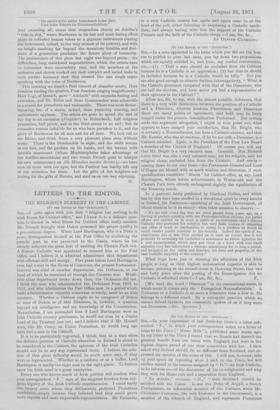[TO THE EDITOR Or TAN “ST.E0TiTOR.1
Sin,—In a note appended to the letter which you did me the hon- our to publish in your last issue, you lay down two propositions which are equally entitled to, and have, my cordial concurrence, viz.,—(1) " That a man should be excluded from the Cabinet because he is a Catholic is an oppression ; (`2) but that he should be included because he is a Catholic would be folly." But you are also good enough to observe further, interrogatively, 4‘ What is the Catholic grievance compared with that of the Dissenters, who are half the electors, and have, never yet had is representative of their opinions in the Cabinet?"
Allow me, Sir, to say, with the utmost po'seible deference, that there is a very wide distinction between the position of a Catholic and a Dissenter, whereas between Churchmen and Dissenters there are many points of agreement, and both may be fairly ranged under the generic denomination Protestant. But setting aside this argument altogether,1 might in turn point out, what appears to have escaped your recollection, that Mr. Bright, who is certainly a Nonconformist, has been a Cabinet minister, and that Mr. Forster, who was at one time, if he he not still, a Dissenter, is a Cabinet minister. Again, is the President of the Poor Law Board a member of the Church of England ? Of course you will say that Mr. Bright is a very eminent man. Granted. But Richard Lalor Shiel was also a very eminent man, yet his religion, and his religion alone, excluded him from the Cabinet. And surely- cotniug down to our own times—the Postmaster-General and Lord °Eagan are blessed with as much wisdom and discretion, if such qualifications constitute " fitness " for Cabinet office, as, say, Lord Hartington, whose heroic achievements in Westmeath and the Phenix Park have already endangered slightly the equilibrium of the Treasury coach.
In a pastoral lately published by Cardinal Cullen, and which has by this time been studied in a devotional spirit in every hamlet in Ireland, his Eminence—speaking of the Irish Government, of whose enemies he is au enemy—thus takes occasion to observe We are told every day that we wore placed, forty years ago, on a footing of perfect equality with our Protestant fellow-citizens, yet public affairs are carried ou in Blich a Spirit of exclusiveness that a sincere Catholic who practises his religion has very little chance of obtaining any &lice of trust or emolument, or rising to u position in which he could render public services to his country. Indeed the spirit of ex- clusiveness hue of late been carried on to such RD extent that it will probably be necessary for Catholics to CODIR1011(10 an active agitation for a real emancipation, which may put them on a level with that small majority that has maintained a ruinous ascendancy for so long a period, and trampled on the rights and liberties, the lives and property, of the vast Catholic majority of the country."
What hope have you of winning the affections of the Irish people, so long as their highest ecclesiastical superior is able to declare, pointing at the council-room in Downing Street, that two
[We used the word " Dissenter " in its conventional sense, in which sense it covers only the " Evangelical Nonconformists." A Unitarian or a Catholic is no inure a Disseeter than is Jew is. He
belongs to a different creed, By a colloquial practice which we cannot defend Quakers are constantly spoken of as if they were not Dissenters,—En, Spectator.]






























 Previous page
Previous page